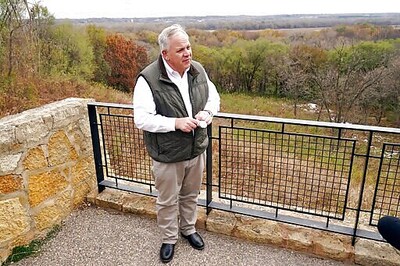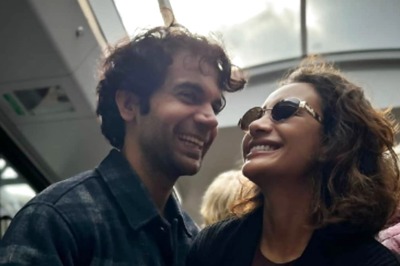
views
The Supreme Court, on Monday, dismissed a petition challenging the government’s decision to carry out the delimitation exercise to redraw the Legislative Assembly and Parliamentary constituencies in Jammu and Kashmir.
The bench headed by Justice AS Oka and comprising Justice SK Kaul delivered the verdict on a plea filed by two Kashmir residents and noted that the Centre has the requisite power under the law to formulate such a commission.
The top court said its decision on delimitation will not have a bearing on a separate batch of petitions challenging the abrogation of Article 370. Pronouncing the verdict, Justice Oka said nothing in this judgement shall be construed as giving an imprimatur to the exercise of power under clauses one and three of Article 370 of the Constitution.
The bench observed that the issue of the validity of the exercise of power relating to Article 370 is subject matter of petitions pending before the apex court.
“We have given the rider that the issue of Reorganisation Act is pending before this Court and we have not said anything on the merits of the same. Otherwise petition is dismissed,” the bench said further, according to a report by Hindustan Times.
The top court is seized of petitions challenging the constitutional validity of the Centre’s decision to abrogate provisions of Article 370 on August 5, 2019.
Several petitions have been filed in the apex court challenging the Centre’s decision to abrogate provisions of Article 370 and the Jammu and Kashmir Reorganisation Act, 2019, which split J-K into two Union Territories — Jammu and Kashmir, and Ladakh.
370, the Central government had revoked the special status of Jammu and Kashmir.
The apex court had on December 1 last year reserved its verdict on the plea challenging the government’s decision to constitute the delimitation commission.
During the hearing on December 1 last year, the Centre had told the top court that the delimitation commission formed to redraw the legislative assembly and Lok Sabha constituencies in Jammu and Kashmir was empowered to do so.
Seeking dismissal of the plea, Solicitor General Tushar Mehta, appearing for the Centre, had argued that the Jammu and Kashmir Reorganisation Act, 2019 does not preclude the establishment of Delimitation Commission by the Central government.
On March 6, 2020, Union Ministry of Law and Justice (Legislative Department) had issued a notification in exercise of power under section 3 of the Delimitation Act, 2002, constituting a Delimitation Commission, with former Supreme Court judge (Retd) Ranjana Prakash Desai as the chairperson.
The counsel appearing for the two petitioners, Haji Abdul Gani Khan and Mohammad Ayub Mattoo, had argued that the delimitation exercise was carried out in contravention of the scheme of the Constitution and alteration of boundaries and inclusion of extended areas should not have been done.
The plea had sought declaration that the increase in the number of seats from 107 to 114 (including 24 seats in Pakistan occupied Kashmir) in Jammu and Kashmir is ultra vires constitutional provisions and statutory provisions, particularly under section 63 of the Jammu and Kashmir Reorganisation Act, 2019.
It had said the last delimitation commission was set up on July 12, 2002 in exercise of powers conferred by section 3 of the Delimitation Act, 2002 after the 2001 census to carry out the exercise throughout the country.
The plea had said the commission had issued guidelines and methodology for the delimitation of assembly and parliamentary constituencies vide letter dated July 5, 2004 along with the constitutional and legal provisions.
“It clearly stated that the total number of existing seats in the Legislative Assemblies of all states, including UTs of the National Capital Region and Pondicherry, as fixed based on the 1971 census shall remain unaltered till the first census to be taken after the year 2026,” the plea had submitted.
It had sought to declare as unconstitutional the notification dated March 6, 2020 constituting the delimitation commission to take up delimitation in the UT of J-K and states of Assam, Arunachal Pradesh, Manipur, and Nagaland by the Centre.
The plea had also challenged the consequential omission of Assam, Arunachal Pradesh, Manipur and Nagaland from the process of delimitation vide notification dated March 3, 2021, claiming that it amounts to classification and violates Article 14 (equality before law) of the Constitution.
Mehbooba Calls SC Verdict ‘Immaterial’
PDP president Mehbooba Mufti said the Supreme Court dismissing the petition challenging the delimitation process in Jammu and Kashmir was immaterial when legal challenges to abrogation of Article 370 and Jammu and Kashmir Reorganisation Act were pending before the apex court.
“We have rejected the delimitation commission from the outset. It does not matter to us what the verdict is,” Mehbooba told reporters here, 41 km from Srinagar.
The former chief minister questioned the SC delivering the verdict on the delimitation petition when other pleas were still pending consideration.
“The challenge to the Reorganisation Act (under which the delimitation process was carried out) is pending, challenge to abrogation of Article 370 is pending before the SC. If all that is pending, how can they (the SC) give verdict on this petition?” she asked.
Mehbooba charged that delimitation was a “tactical process of rigging before the elections. That’s what they have done, converting the majority into a minority, in favour of the BJP. We have not even participated in the discussions of the delimitation commission.” Asked if she still had faith in judiciary, Mehbooba said the courts were the last hope and resort of anyone in the country.
“As far as the judiciary is concerned, where will a poor person go? Even (Chief) Justice D Y Chandrachud has said that lower courts are scared of giving bail. If a court is scared of giving bail, how would they deliver (fair) verdicts?” she said.
“There was a time when a verdict from the court unseated then Prime Minister Indira Gandhi. Today, people don’t even get bail from the courts,” she added.
(With PTI inputs)
Read all the Latest India News here

















Comments
0 comment